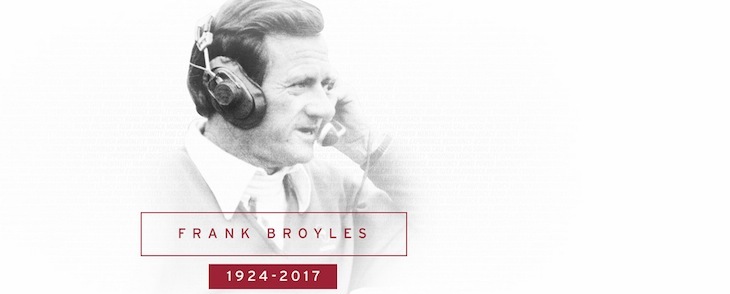Economist Mervin Jebaraj reminds that Frank Broyles economic impact more than $2.9 billion
by August 27, 2017 9:51 am 734 views

On its 10-year anniversary, economist Mervin Jebaraj dusted off a 2007 economic impact study that shows Frank Broyles’ leadership contributed at least $2.9 billion to Northwest Arkansas’ economy.
Jebaraj, interim director of the UA Walton College of Business’ Center for Business and Economic Research, said the study was conducted when Broyles retired from the school. Broyles, the legendary Razorback coach and athletic director, passed away earlier this month at the age of 92.
“Let me start by saying that we’re only measuring some of his contributions,” said Jebaraj. “Frank Broyles’ contributions to the state of Arkansas, to football in general, are probably immense. And him as a person, and the number of people whose lives he’s touched, there’s no way we could measure all of that.”
The CBER report reviewed the economic impact of Broyles’ 50-year storied career at the University of Arkansas. From new buildings and expansions in football, basketball, baseball and track, Broyles’ fundraising prowess and guidance of the athletic program was remarkable and it spilled over into other benefits for the school.
“We came up with a number: his economic impact was about $2.9 billion in 2007,” said Jebaraj. “About $600 million of that was construction, and if you looked at pictures of what the University of Arkansas campus was in 1958, and what it was in 2007, when we preformed the study, you’d see the dramatic improvement in both academic buildings and athletic facilities. So that’s what contributes to some of that $600 million figure that we’re talking about.”
Visitor spending and quality of life are also part of the dynamic of the economic research.
“Fan attendance grew during this time period as the football program in particular has grown. So has basketball and baseball as well. So, all of those dollars coming in — about $2.9 billion over that time… it’s not just the restaurants, the bars, the hotels and the retail venues as well. It all adds to the quality of life that you have up here Northwest Arkansas, and the Razorback games are a big, big part of it,” he said.
Jebaraj, appearing on this week’s edition of Talk Business & Politics, also looked at major current developments in the Arkansas and national economy. Record low unemployment of 3.4% presents a rosy picture of the Arkansas jobs scene boosted even further by employment growth. More than 9,100 net new jobs were added in Arkansas in July and 33,000 net new jobs in the last year.
The UA economist also said the recently-closed quarterly earnings period indicated a healthy corporate climate.
“Eighty percent of those who reported in the S&P 500 reported earnings that beat analysts’ expectations, so that is particularly great news,” Jebaraj said. “And there are several reasons why that’s happening, and that’s one, in particular, is that the U.S. economy has been growing for 98 straight months now. I know it sounds like I’m talking about a baby in terms of months of the economic expansion, but that’s currently the third longest economic expansion in U.S. history, at least since we started keeping record in about 1850’s.”
“The other piece of this is a weak U.S. dollar, and the U.S. dollar is weak in particular, because some of the broader policy agenda issues in Washington D.C. regarding corporate tax reform and an infrastructure bill haven’t happened so far. Those are things that have [traditionally] driven up the deficit, pushed up U.S. Treasury yields. Neither of those things have happened. The deficit hasn’t been driven up, treasury yields are down, so the U.S. dollar is weaker, which is improving our export picture,” he added. “And our trading partners in Europe and in the Asia Pacific region are seeing economic growth as well. Europe in particular has seen 14 consecutive months or so of economic growth, not like the 98 that we have here in the United States, but it’s nice to see our trading partners doing well, and their doing well helps us earn more money off of them as well.”
Watch Jebaraj’s full interview in the video below.
